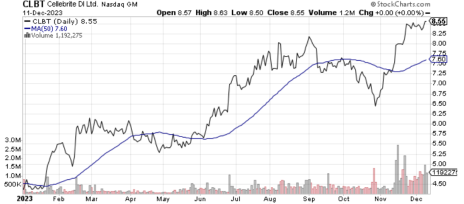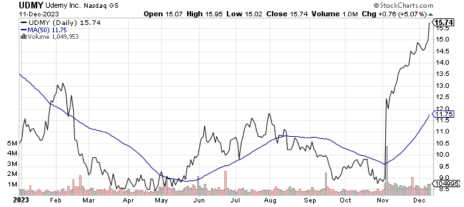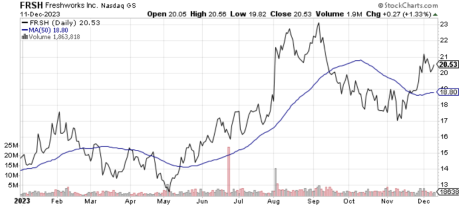Buoyed by the growth potential from artificial intelligence (AI) technologies and rate cuts in 2024, small-cap cloud software stocks have been on a roll.
Just look at the year-to-date performance of the Global X Cloud Computing ETF (CLOU) and WisdomTree Cloud Computing Fund (WCLD). Both are up around 30% so far this year.
While not small-cap-specific ETFs, both CLOU and WCLD carry decent small and mid-cap exposure and offer a good way to gauge performance of the space.
That said, there is always more upside, and downside, with individual stocks.
[text_ad]
Here are three small-cap cloud software stocks that are on the move, and worth the consideration of risk-tolerant investors.
Small-Cap Cloud Software Stock #1: Cellebrite (CLBT)
Cellebrite (CLBT) is up roughly 96% in 2023. It is a $1.7 billion market-cap software company providing intelligence solutions for public and private-sector organizations.
Customers use its software platform to navigate the complexities of legally sanctioned digital investigations, doing everything from collecting, reviewing, analyzing and managing data.
The technology is used to help convict bad actors and bring justice for a wide variety of crimes, from drug and human trafficking to fraud to homicide.
It is used by all 50 U.S. states, over 18,000 law enforcement agencies, top accounting, pharma, telecom, and software companies, the biggest banks out there and numerous federal offices.
Management made a strategic decision recently to refocus on its biggest markets, namely North America and Western Europe, and reduce its focus on small, niche markets. That decision has paid off and allowed sales teams to expand in the key mid-to-large government agency space, where customers often start with the core Collect and Review modules then expand to modules for sharing, compliance and auditing over time.
Cellebrite is also enjoying the ongoing benefits of a transition to the SaaS-based software model, which is more dependable, efficient and aligned with growth-driven strategies.
In Q3, reported on November 14, revenue grew 17.4% to $84.2 million. Adjusted EPS was $0.09.
Following the release, management increased the low end of full-year guidance, calling for revenue to grow by 16% to 18%. Currently, analysts are looking for the company to post similar growth in 2024, when Cellebrite is expected to post its first year of non-adjusted profitability.
This is what the chart looks like.
Small-Cap Cloud Software Stock #2: Udemy (UDMY)
Udemy (UDMY) is up about 50% in 2023. It is an online education marketplace for personal and professional courses. The platform hosts over 200,000 courses taught by more than 70,000 instructors to roughly 60 million learners. Courses are offered in dozens of languages across more than 180 countries.
The pitch for drawing people to the platform is that Udemy offers the tools learners, instructors and enterprises need to reach their full potential, regardless of where they are and what their interests are.
Online courses span a huge range of subject matters including programming, web development, finance, business, design, marketing, photography, music and more.
While people can go to Udemy and find a course to help them learn to play the drums, practice mindfulness or work on their productivity habits, the bulk of revenue comes from employers, which the company calls its Udemy Business segment.
With Udemy Business, employees can sign up for employer-sponsored, on-demand classes to round out and/or learn new skills that can help their performance, compensation and career track.
The consumer business, which faces a tougher growth trajectory, is one of the reasons UDMY stock suffered for much of the year. Another reason is that the company hasn’t been profitable, and analysts hadn’t seen the first profits coming for some time.
That changed in Q3, however, when the company generated positive EPS of $0.05 (a surprise of $0.07), on revenue of $185 million (+16.6%), also better than expected. The stock has been on fire since the Q3 report on November 2.
Behind the scenes, much of the stock’s performance is due to Udemy’s plan to slash instructor revenue share from 25% currently to 20% in 2024 and trend down from there, until it reaches 15% in 2026. The idea is to reinvest some of the cost savings in growth initiatives like new products.
That could work out very well, though it’s worth pointing out the fairly obvious risk that instructors could bail on the platform because their revenue share will be reduced. On the other hand, growth initiatives could bring more subscribers to the platform, and combined with other moving parts, it’s possible the net impact to instructors will be muted, or even work out to a net positive over time. Something to watch.
As of right now, analysts see Udemy growing revenue by 14.3% to $830 million in 2024 and delivering the first year of adjusted profitability (adjusted EPS Of $0.04 expected).
Small-Cap Cloud Software Stock #3: Freshworks (FRSH)
Freshworks (FRSH) has risen about 40% in 2023. It is a $6 billion market-cap software company specializing in customer service, IT and CRM solutions that help businesses improve customer relationships and employee satisfaction.
The company was started in India in 2010 and still has the majority of its employee base located there, despite moving its headquarters to California in 2018. The India-based workforce drives about a 75% cost advantage in R&D relative to competitors.
Freshworks’ main product is Freshdesk, an omni-channel customer support solution. Based on the success of Freshdesk, the company launched Freshservice, an IT service management platform. It also offers Freshsales for sales automation and Freshmarketer for marketing automation.
As you’d expect, the company is playing with AI and has developed AI tools branded under the name “Freddy.” Its latest AI offering ties together a few solutions that had a strong beta launch in June and has piqued investor interest on the last two earnings calls.
AI solutions are being packaged into a new Customer Service Suite, part of management’s strategy to raise prices as both new and renewing customers appear to be willing to pay a little more for generative AI capabilities.
That momentum was seen in Q3 (reported October 31) when Freshworks beat expectations to deliver revenue of $151.6 million (+17.8%) and EPS of $0.08 (a $0.03 beat).
Looking forward, expect revenue to grow 19.4% this year and another 18.4% in 2024. Moreover, Freshworks should deliver consistent adjusted profitability moving forward. EPS should be around $0.24 this year and $0.31 in 2024.
This is what the chart looks like.
What Small-Cap Cloud Software Stocks Am I Recommending Now?
Of the three small-cap software stocks I just mentioned, my favorite right now is CLBT. I think the reward vs. risk profile of that name is the most attractive.
That said, my very favorite small-cap software stock is reserved for subscribers to Cabot Small-Cap Confidential.
I just added this cloud software stock to our portfolio last week and it’s already showing gains. It sells enterprise software on a cloud subscription model – like Microsoft Office.
The company has a market cap under $2 billion, is growing revenue north of 20% and throws off a ton of cash relative to its size. Moreover, I rarely see this stock in the media, despite impressive growth and achievements.
I think that’s about to change.
[author_ad]




